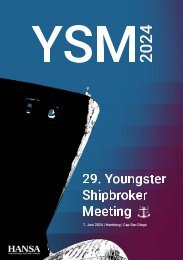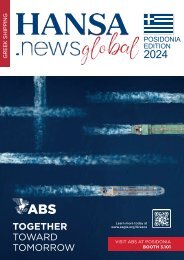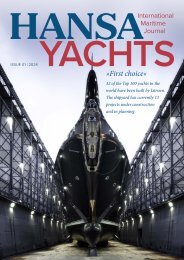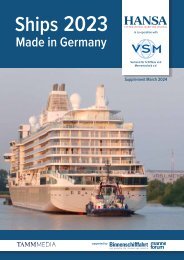HANSA 02-2019
Nord-Ostsee-Kanal | MSC Zoe | Reefer-Report | Nordfrost | MacGregor | Neues Bergungsmanöver | Ships made in Germany 2018 | Havarien & Brandschutz | Rudolf A. Oetker
Nord-Ostsee-Kanal | MSC Zoe | Reefer-Report | Nordfrost | MacGregor | Neues Bergungsmanöver | Ships made in Germany 2018 | Havarien & Brandschutz | Rudolf A. Oetker
Sie wollen auch ein ePaper? Erhöhen Sie die Reichweite Ihrer Titel.
YUMPU macht aus Druck-PDFs automatisch weboptimierte ePaper, die Google liebt.
Schiffstechnik | Ship Technology<br />
Measuring the gap<br />
In a time where savings are key to the shipowner, could it be that the hull could provide more<br />
answers to the solution? Danish-based Jotun believes that more savings can be achieved<br />
through hull monitoring, writes Samantha Fisk<br />
The percentages that shipowners<br />
could save and make their ships<br />
more efficient through either equipment<br />
or design to meet with regulations or<br />
to cut costs has been criticised over the<br />
years, but can all the numbers add up if<br />
it is done right?<br />
Stein Kjølberg, global sales director<br />
for hull performance solutions believes<br />
that shipowners are missing out on a<br />
golden opportunity for further potential<br />
savings across their fleet with hull<br />
monitoring. He explains that: »When we<br />
talk about hull conversions we thought<br />
that this was a common theme in the<br />
market, but it was not. So, the approach<br />
to how to handle things and do analysis<br />
for owners and show them different savings<br />
through hull coatings was a wakeup<br />
call.«<br />
Kjølberg notes that only 15% of the<br />
word fleet have equipment installed for<br />
hull monitoring and then only half of<br />
them are using it in an efficient way. The<br />
challenge that lies ahead for the industry<br />
and for Jotun, it appears, is to educate<br />
the market about what could be achieved<br />
from performing hull monitoring and<br />
learning how to access the raw data and<br />
use it effectively.<br />
The main drivers pushing for this are<br />
the International Maritime Organization’s<br />
sulphur regulation that is looking<br />
closer than ever coming into effect<br />
and will potentially have sever repercussions<br />
for shipowners that aren’t compliant<br />
when it becomes effective.<br />
»IMO 2<strong>02</strong>0 will of course happen.<br />
Those who do not move to scrubbers will<br />
have to pay more for compliant fuel and<br />
have a bigger interest in finding ways to<br />
reduce the fuel bill. Those investing in<br />
scrubbers will still see an increase in fuel<br />
consumption as the auxiliary engine will<br />
have to help out«, explains Kjølberg.<br />
58 <strong>HANSA</strong> International Maritime Journal – 156. Jahrgang – <strong>2019</strong> – Nr. 2


















